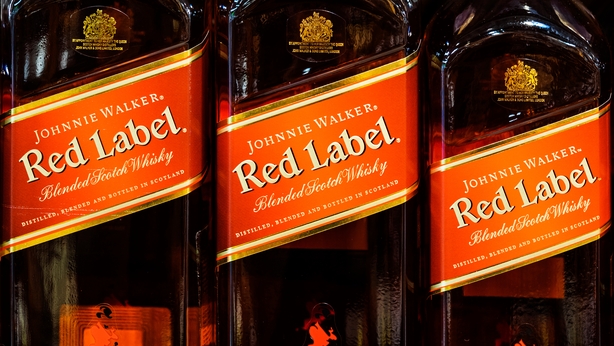Shares in Diageo, the world's top spirits maker, slipped over 3% today as it warned of further troubles in Latin America, adding to investor concerns a build up of unsold stock in the region would be hard to clear.
The maker of Guinness, Johnnie Walker whisky and Tanquery gin also posted a slight decline in organic net sales, just missing analyst estimates, and pointed to a drop in North America - its biggest market, where the company has been losing market share.
"We are not satisfied with these results and I personally am restless to get this business to perform to its full potential," chief executive Officer Debra Crew, who took the helm in June, told journalists.
In November, Diageo warned that sales in Latin America and the Caribbean were set to decline by more than 20%.
It reported today that sales there had fallen by 23%, and said it expects a further decline of 10%-20% in the second half.
Unsold stock has built up in Latin America following a slowdown in demand for expensive spirits. Diageo said in November it became aware of the problem at a relatively late stage.
The admission knocked investor confidence and put a spotlight on Crew a few months into her tenure, with some shareholders worried about how the business would handle bigger threats, including a decline in market share in North America.
"It has amplified concerns rather than put them to bed," Trevor Stirling, analyst at Bernstein, said of Diageo's first-half results.
While not significantly worse than expected, he said, they had added to worries, including that difficulties in Latin America appeared more widespread than previously thought and leading brands in North America were flagging.
Latin America only accounts for around 11% of sales, but is a high margin business and therefore had a bigger impact on Diageo's organic operating profit.
That fell 5.4%, a worse result than forecast by analysts. Diageo said it expected a further decline in the second half but at a slower rate.
Crew told journalists there were likely a few months of excess stock in Latin America, and the company expected to have cleared these by the end of its financial year.
It had put in place actions to avoid a repeat of the problem, including measures to gather better data on sales, she continued, adding a global review had left her confident Diageo had sufficient processes in place in other regions.
Red Sea disruption delaying some spirits shipments
Diageo is seeing delays in shipping some of its products due to attacks on vessels in the Red Sea, and is putting in place contingency plans, its chief financial officer Lavanya Chandrashekar said today.
Attacks by Iranian-backed Houthi rebels in the crucial Red Sea shipping lane have in recent months severely disrupted shipping in the Suez Canal, the shortest sea route between Asia and Europe.
Diageo ships products like Johnnie Walker whisky, which can only be made in Scotland, and tequila, made in Mexico, all over the world.

Chandrashekar told Reuters shipments of products like Scotch to Asia were facing delays as vessels re-route to avoid the Red Sea.
She did not say whether this would have any impact on the company's outlook for this year, but said Diageo already had additional inventory in different regions, with a hub in China, for instance, holding stock to act as a buffer in emergencies for Asian markets.
"We always have safety stocks - we live in a volatile world and even if it's not geopolitical incidents, things can go wrong," she said, adding Diageo had invested to ensure it could react in such a scenario.
The company was reassessing its levels of safety stock following disruptions in the Red Sea and was planning to hold a higher number of days of stock where required, she continued.
Diageo has previously said that trading in some markets in the Middle East had effectively ceased following Hamas' October attack on Israel and the subsequent conflict.
Chandrashekar and CEO Debra Crew said on Tuesday that distributors in some markets in the region had essentially stopped making orders following the attack. The situation remains "far from normal", Crew added.
The main impact was in Lebanon, another big Scotch market, Chandrashekar said, where people were going out socialising and celebrating less. More broadly, the conflict had affected sentiment across the region, she added.

